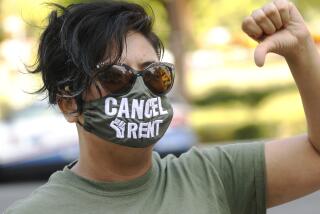Going Beyond the Obvious
- Share via
Several of the city’s top officials are proposing solutions for abusive panhandling. City Councilman Joel Wachs is sponsoring an ordinance backed by Mayor Richard Riordan that would be one of the most aggressive of its kind in the nation. City Atty. James Hahn has a less sweeping version, backed by council members Ruth Galanter and Mark Ridley-Thomas.
Under Wachs’ proposal, $500 fines and jail sentences of up to six months could be imposed on repeat offenders. In some cases, violators could be cited for just sitting or leaning on public property. Following, touching and threatening people would be outlawed.
Must be an election year. Surely everyone can agree that abusive panhandling should not be tolerated. Now what? Strict enforcement of any new law of this kind is sure to be problematic. The LAPD is too short-handed and inadequately equipped for a new task, and Los Angeles jails are already overcrowded.
Riordan says that the Wachs ordinance would provide authorities with new tools to at least clear an area of abusive panhandlers and would not tax the LAPD or the jails.
In Orange County, a number of cities in recent years have outlawed “aggressive panhandling,” although enforcement has been rare. Orange County has only limited services and shelter for the homeless, and the county’s bankruptcy ended most programs for the mentally ill. This has meant an increase in the number of street-dwelling homeless people, who usually rely on panhandling for survival.
The most comprehensive municipal solutions take such human conditions into consideration. For example, the Santa Monica crackdown on abusive panhandling that inspired the Los Angeles effort included new programs for shelter, meals and job opportunities.
Private business efforts too have achieved some success. In the Los Angeles garment district, the “fashion police,” funded by businesses, has helped stunt the growth of abusive panhandling and encouraged shoppers to reenter the area. Baltimore police and that city’s hospitality industry have trained citizens to act as safety guides who provide a buffer between the public and the panhandlers. In Portland, Ore., the “Green Jackets,” hired by local merchants, helped move panhandlers out of commercial areas and directed them toward shelters and food kitchens.
Even narrowly targeted crackdowns on abusive panhandlers ought to include some of these elements to increase the chance for success, and the mayor and the council would do well to consider them.
More to Read
Sign up for Essential California
The most important California stories and recommendations in your inbox every morning.
You may occasionally receive promotional content from the Los Angeles Times.










